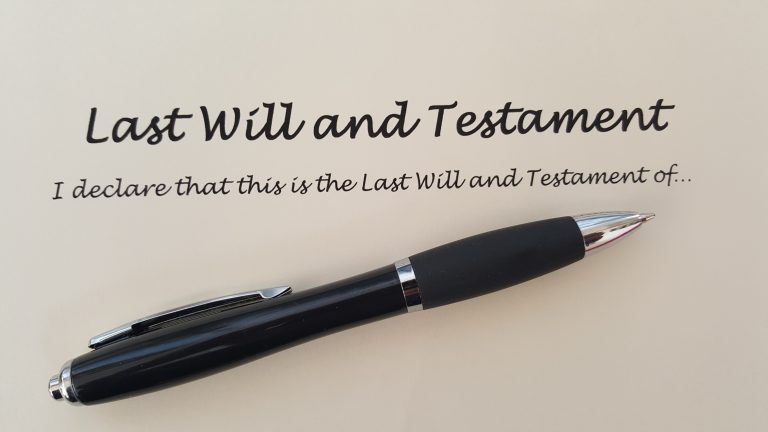Frequently Asked Questions: Making a Will
If you are making a Will for the first time, it’s natural that you will have plenty of questions. Here are some Frequently Asked Questions about making a Will that should help you to prepare.
What information do I need to have to make a Will?
Prior to making a Will, it is a good idea to list the assets you own and give an approximate value to these. This includes any residential or commercial property you own, life insurance policies, savings, shares, cars or other assets of worth.
If you own property with another person, it is important to know whether you own this jointly or as tenants in common as this affects the legal ownership and how the property will pass on death. In most cases, properties owned between couples is bought as joint tenants unless there has been a significant difference between who contributed financially to the purchase.
If you own a business or foreign property, then having the details of this will be important too.
What is a mirror Will?
This is where a couple (married or unmarried) both make Wills that contain similar provisions. Couples are not bound by the terms of each other’s Will and are free to make changes to their Wills in the future.
Can I change my Will in the future?
Yes – providing you have the mental capacity to do so. Mental capacity can be lost through accident and illness with these risks increasing as we get older. This is why it is important not to leave your planning too late.
How often should I review my Will?
Your Will should be kept up to date with the changes in your life. A review every three to five years is wise or following a significant change in your circumstances or those of your executors or beneficiaries. Life events such as births, deaths, relationship changes and significant changes to property or financial circumstances should prompt you to review your Will.
Does marriage revoke a Will?
If you get married, any Wills made before the date of your marriage will be revoked. The only exception to this is if there is a clause confirming that your Will shall not be revoked if you marry a specific person. You should have your Will professionally checked if you are unsure.
Do I have to wait until I am divorced to write a new Will?
No – You can write a new Will before divorce proceedings are started or completed. Divorce proceedings can take a long time to finalise and so during the period of separation, it is a good idea to put a new Will in place. If you do not make a new Will, then as you are still married the default position will be that your estranged wife or husband will inherit.
How do I ensure my children inherit if my husband/wife remarries in the future?
Many people include Trusts within their Wills to give them peace of mind that assets such as the family home can pass to their own children and not to other families. In an interview with the Daily Telegraph, Stuart Herd, tells his own story of how he was disinherited in favour of his step-mother’s children to warn others of the limitations of mirror Wills alone in protecting inheritance.
Where should I store my Will?
Once you have made a Will, you need to keep it safe and ideally let your executors know where it is stored. The original document is the one that will be needed at Probate. If no Will can be found, the assumption will be made that you have not made a Will and the default intestacy laws applied instead. At Trent Wills & Estates, we offer a document storage service that gives you peace of mind that your Will is safe and protected from loss, theft or damage.
Who can be a guardian?
A guardian can be a friend or family member who is over the age of eighteen and ideally living in the UK. Factors to consider are the guardian’s health, age, lifestyle and financial circumstances as well as how you believe that they would care for your child. A guardianship appointment would only come into effect if at the time of death, you have children under eighteen and there is no other person with parental responsibility alive. Making a Will is a legally valid way to appoint guardians for your children. Without a Will, your wishes won’t be known.
What does an executor do?
Many executors, especially those who are friends or family members of the deceased, underestimate the amount of time and work involved. They are also unaware that once they act as executor that they are personally and financially liable for their actions.
Typical tasks include:
- Registering the death and arranging the funeral
- Identifying assets owned by the deceased and arranging valuations
- Identifying creditors, paying debts and closing accounts
- Completing tax returns
- Obtaining the Grant of Probate
- Tracing beneficiaries
- Distributing the estate according to the terms of the Will
Trent Wills & Estates can take this responsibility from your loved ones and give you peace of mind that your wishes will be carried out with the care and skill required. We provide fixed fee Probate services.
I’m married – will my spouse get everything even if I don’t make a Will?
Not necessarily!
If you are married (or in a civil partnership) but have children, the answer is that it depends on the size of your estate. The current rules enable the surviving spouse to inherit the first £250000 and personal possessions. The remainder of the estate would then be divided between the surviving spouse and any children of the deceased. This can produce some very difficult situations if there becomes co-ownership with adult children or money to be held on trust for minor children. Application of the intestacy rules can also result in Inheritance Tax being payable from the estate on first death as the estate is not passing fully to the surviving spouse. By making a Will, you can make plans that will help your family and utilise Inheritance Tax exemptions for married couples.
If you are married and do not have any children, then your spouse will inherit your estate in full under the current intestacy rules. Whilst this provides some protection, making a Will gives you the additional benefits of being able to appoint him/her or others to act as executors making it easier for your estate to be administered. It also enables you to make provision for others should your spouse predecease you. This gives you the freedom to choose (friends, family or charity) who inherits rather than the intestacy rules being applied without you having a say.
Can my partner inherit?
Unmarried partners (regardless of how long you have been together) do not have any automatic right of inheritance. If you die without a Will, the rules of intestacy will be applied. Your estate will be distributed to your nearest relative in terms of the order that they appear in the intestacy rules.
Depending on how you own your property, your partner could end up without a home or co-owning it with your relatives. Your money and personal possessions will also go to your relatives. This could create serious financial problems for your partner and destroy family relationships. Your partner (if eligible) may be forced to make a claim to Court for provision against your family’s right of inheritance. This will be very expensive and stressful with no guarantee of success.
The only way to ensure your partner is protected as you may wish is by making a Will.
To book a no obligation consultation visit www.trentwillsestates.co.uk or call 0115 8461446






